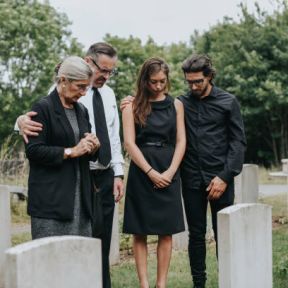Seeking Help for Suicidal Thoughts
Recognizing suicidal thoughts or behaviors in oneself or in a loved one can be immensely frightening, and many people have little idea how to respond when they realize that they or someone they know is seriously considering harming themselves. But it's important to remember that help is available at all hours of the day or night, and reaching out about suicidal thoughts or behaviors can help save a life. Mental health experts urge quick action in response to suicidal thoughts, even in cases where the imminent risk of death appears low.
Suicide hotlines, crisis centers, or local authorities are the best resources in an immediate crisis. Once the immediate danger has passed, seeking help from a trained mental health professional is the best approach to manage suicidal ideation over the long term, to address comorbid mental health challenges, and to help foster better well-being and a restored sense of hope.
For immediate help in the U.S., 24/7: Call 988 or go to 988lifeline.org. Outside of the U.S., visit the International Resources page for suicide hotlines in your country. To find a therapist near you, see the Psychology Today Therapy Directory.
Once you realize that you have a serious desire to hurt yourself, die, or simply "stop existing," it's imperative that you let someone know and/or seek emergency mental healthcare. Despite the hopelessness you may feel at the moment, help is available—and the vast majority of immediate resources are free and are accessible 24 hours a day. If you are in an active suicidal crisis, such resources can save your life—and even if your suicidal ideation has not yet formed into a plan, they can provide emotional support and/or connect you to long-term care.
Those in the U.S. should call the National Suicide Prevention Lifeline at 1-800-273-8255. The Lifeline is available 24 hours a day and the help provided is free and confidential. It is accessible in both English and Spanish (for Spanish, call 1-888-628-9454). Those who speak other languages should call the main line, as translators are available for a large number of languages. Individuals who are deaf or hard of hearing can reach an accessible version of the lifeline by dialing 1-800-799-4889.
Whichever number is called, trained counselors (often working in local crisis centers nearby to the caller) will be available to talk, help the individual navigate their mental health emergency, and provide emotional support.
If speaking on the phone is not possible, those in crisis can also get 24/7 text-based support from Crisis Text Line by texting “HOME” to 741741 (U.S. and Canada), 85258 (U.K), or 50808 (Ireland). There are also suicide hotlines geared toward specific demographics, such as The Trevor Project (1-866-488-7386), which helps LGBTQ+ youth who are in crisis.
Many other countries have their own suicide hotlines or text-based crisis services, which can be found on the Suicide Hotlines and Prevention and Resources page or via an internet search. If one is not readily accessible, call your local emergency number for immediate assistance. Some cities and towns around the world may also have in-person crisis centers that can assess individuals in crisis and connect them to further services; these can also be found via an internet search.
Even if there is not an immediate crisis, suicide hotlines like the U.S.'s National Suicide Prevention Lifeline (1-800-273-8255) and the Crisis Text Line (text “HOME” to 741741 in the U.S.) are available 24 hours a day to offer emotional support, help someone assess their risk, and connect individuals to resources in their area. Those outside the U.S. can visit Suicide Hotlines and Prevention Resources to locate help in their area.
Help for passive suicidal thoughts (i.e. those in which there is no concrete plan to take action) can also be sought from a trained mental health professional; to find someone near you, visit the Psychology Today Therapy Directory.
In the meantime, individuals who are experiencing suicidal ideation shouldn’t hesitate to reach out to family, friends, or other loved ones; in addition to providing much-needed emotional support, they can provide an outside perspective to help determine if more immediate help could be beneficial. Loved ones can also assist in finding a therapist, which can be a daunting process even without the additional burden of suicidal ideation.
Reaching out to a suicide hotline or crisis text line is completely confidential in the vast majority of cases. In very rare instances—in which the trained crisis counselor determines that the caller is in immediate danger and they are unable to de-escalate the situation—they may contact local authorities to follow up with the individual to make sure they are safe. However, suicide hotlines will only use this option as a last resort; for most calls, they will speak only with the caller to establish a safety plan and connect them to further resources. Suicide hotlines will never release information about a caller after the fact.
Similarly, therapists are required to practice confidentiality in the majority of cases. They will not divulge anything they discuss with a client—including suicidal thoughts—unless the client or another individual is determined to be in immediate danger.
A suicide safety plan is a set of concrete steps an individual will take when they recognize that they are at risk of suicide or are starting to display warning signs. Safety plans can be designed with the help of a therapist or crisis counselor; individuals can also establish informal safety plans on their own.
Safety plans typically include the identification of warning signs that the individual should watch out for (such as suicidal thoughts, distorted thinking styles, or increased social isolation), as well as concrete coping strategies they can employ in response. Coping strategies can include engaging in a soothing, distracting activity when suicidal thoughts arise; leaving their immediate environment to be around others whenever the thoughts escalate; reaching out to family or friends for emotional support; and/or seeking out mental healthcare if necessary (either from a therapist or from a crisis intervention service). A study of suicide safety plans found that the intervention was successful at curbing future suicide attempts in at-risk individuals.
Recognizing warning signs of suicidal thoughts or behavior in a loved one—or hearing that they are thinking of hurting themselves imminently—is alarming and confusing. But help is always available, and all the resources that are available to individuals in crisis—including suicide hotlines, crisis centers, or local emergency services—are available to their loved ones as well, and reaching out to one of them could help save your loved one's life.
Once the immediate crisis has passed, you may wish to consider encouraging your loved one to seek long-term mental health care, or helping them do so. To find someone near your loved one's location, visit the Psychology Today Therapy Directory.
Anyone who believes that someone they know is thinking of suicide should get help as soon as possible. Suicide hotlines (such as the National Suicide Prevention Lifeline, which can be reached at 1-800-273-8255) can help someone assess their loved one’s immediate risk, locate resources in their area, and provide much-needed emotional support. If the danger is imminent (i.e. the loved one is holding a gun or has immediate access to other means of harming themselves), call 911 or a local emergency number. To find a suicide hotline in your country, visit Suicide Hotlines and Prevention Resources.
Absolutely. The vast majority of crisis lines accept calls both from individuals who are themselves at risk and from concerned others seeking guidance; anyone who calls will be offered emotional support and connected to additional resources as needed. It is also possible to encourage the person at risk to seek help themselves, either from a suicide hotline or from a trained mental health professional. If they’re nervous, it can help to remind them that suicide hotlines are free and confidential, and don't require that the person be in immediate danger in order to help.
No private citizen can force or compel another person to enter therapy. But it is possible to encourage someone to go, talk them through any concerns they may have about the process, help them find a therapist in their area, and accompany them to their appointments if they desire moral support.
If the person is resistant to therapy, listen to their reasons and respect their autonomy. However, if the reasons for their hesitation are based on misconceptions, it can be helpful to counter their fears with accurate information. If they fear, for example, that their therapist will divulge their private information to others, explain to them that therapists are required to keep clients' information confidential unless they pose a direct threat to themselves or others.
For more information on finding help for a loved one, see the Therapy Center.
It’s common for individuals who share their suicidal thoughts to ask that they be kept secret. But their life could be in danger, and keeping their suicidal thoughts to yourself does them a disservice and may put them at risk. If someone you care about tells you they are having suicidal thoughts, it is imperative that you take steps to get them help—whether by calling a suicide hotline, contacting a local emergency number, or reaching out to a mental health professional.
It’s normal to feel conflicted or as if you’re betraying your loved one’s trust, and it’s true that they may, at first, be angry at you for sharing their secret. But your loved one’s safety must come first. Suicidal thoughts can easily spawn deadly or injurious behavior, and thus should always be taken seriously and responded to appropriately. It is likely that your loved one eventually comes to be grateful that you took action to protect them from harm.
Anyone experiencing suicidal thoughts—whether fleeting, passive, or active—should feel empowered to bring them up to their mental health professional, as a therapist can help them both assess the risk the thoughts pose and cope with the thoughts themselves. It can feel unnerving to bring up suicidal thoughts in therapy, but helping a client manage such thoughts is a crucial part of a therapist's job; they are trained to listen, respond appropriately, and help as needed.
Clients who are experiencing thoughts of suicide—even if they’re vague or passive—are advised to share them with their therapist, even if it’s challenging to do so. Therapists are trained to navigate such discussions calmly and professionally, and a good therapist will not overreact or become upset when a client shares his or her suicidality.
If the thoughts are happening currently, the therapist will ask a series of questions to assess the client’s risk, determine the next steps, and/or set up a safety plan in case the thoughts become more severe. In severe cases in which the client is determined to be in immediate danger, hospitalization may be considered. However, if the client does not appear to be in crisis, the therapist will likely help them navigate the thoughts in therapy while establishing a long-term safety plan. This will likely involve connecting the client with resources (such as a local crisis center or suicide hotline) in case the thoughts escalate.
If the thoughts happened in the past and are no longer occurring, sharing them with the therapist can still be useful. Understanding a client's personal and mental health history can help the therapist better serve him and will help both client and patient better address future suicidal thoughts, should they ever arise.
When a client is determined to be an immediate danger to themselves or others, it is possible for them to be admitted to a hospital for inpatient treatment. This can be either voluntary (if the client agrees to receive more intensive care) or involuntary (if the client does not wish to be hospitalized). Evidence shows that voluntary hospitalization tends to result in more positive outcomes than involuntary hospitalization; however, involuntary hospitalizations are sometimes deemed necessary for an individual’s safety and the safety of those around them.
Involuntary hospitalizations are typically only used in cases of severe mental illness, violence, recent suicide attempts, and/or imminent suicidality. While the idea of involuntary hospitalization is understandably frightening to many, the vast majority of therapists take their clients’ rights extremely seriously and will only consider involuntary hospitalization in order to save their client’s life or save another person from danger.
Therapy can both help a client identify the cause of suicidal thoughts (such as depression, bipolar disorder, a recent trauma, or severe economic stress) and help her develop coping mechanisms to minimize their impact or to face them again in the future, should they arise again. Since suicidal ideation is often the result of distorted negative thought patterns (such as “No one would miss me if I was gone” or “My life will never get better”), the therapist may use cognitive behavioral techniques to help the client recognize and challenge the faulty thoughts. Therapists also help clients identify new coping mechanisms and ways of solving problems that help restore a sense of agency and hopefulness to their life.














